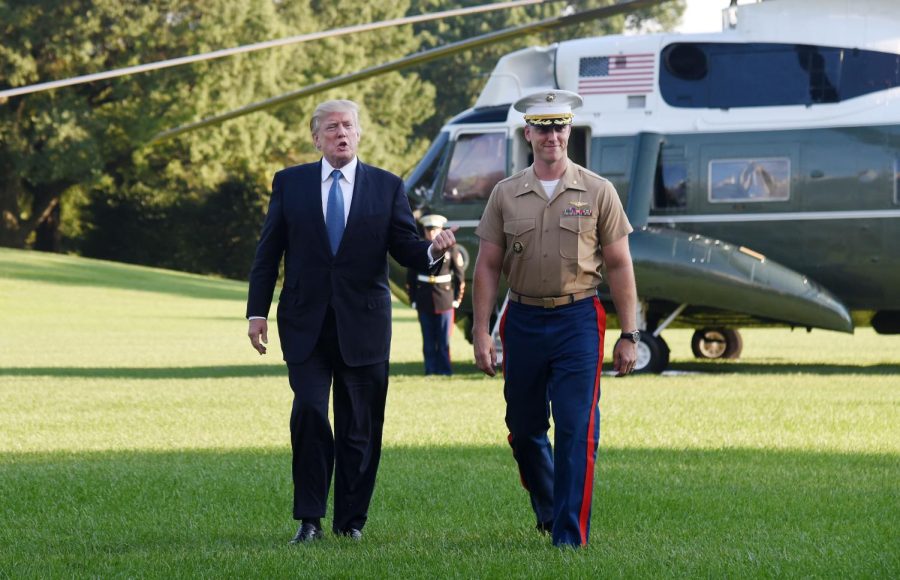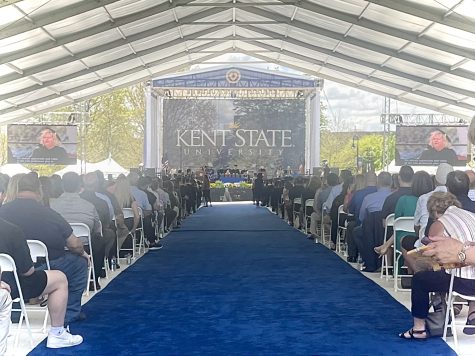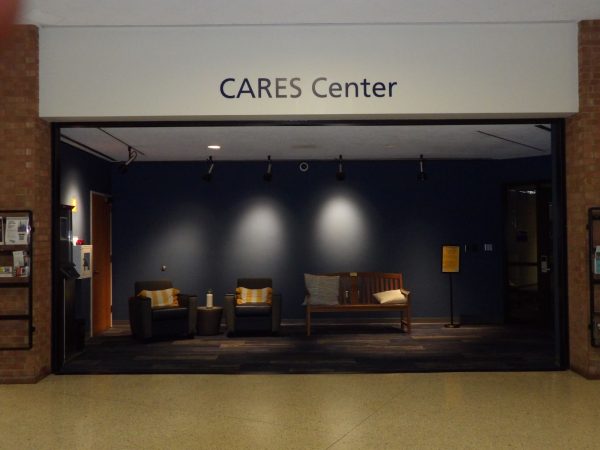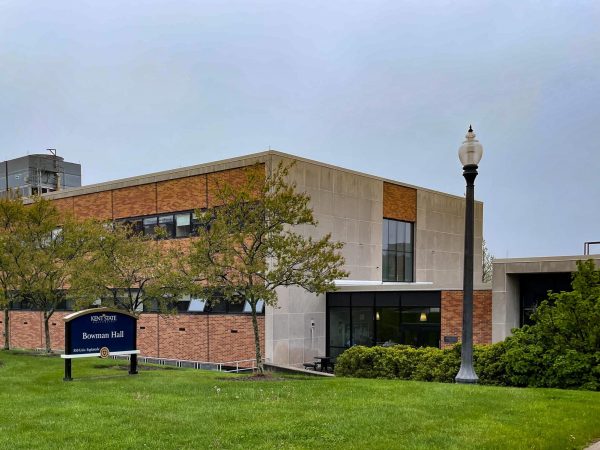Travel ban 3.0 strikes contemplation, dissent, defense across campus
President Donald Trump walked toward the White House with pilot James Thompson Jr., who completed his last Marine One flight, on the South Lawn of the White House in Washington on Sunday, Sept. 24, 2017.
September 25, 2017
The President Donald Trump and his administration expanded restrictions on immigration and travel for eight countries on Sunday, adding to limitations already imposed by a previous ban — a decision already sparking conversation in communities like Kent.
“Historically, travel bans in the United States were just masked forms of racism,” said Layla Fetters, a freshman history major. “We did it to the Chinese and other countries in the 1900s, and we ended up being super duper terrible to those countries that we were making these bans against, and incited violence against those people, and … it’s not okay for that to be our foreign policy goal.”
The order is the third version of a travel ban first issued in January, which was later amended by the Trump administration.
“To understand the current one, you have to understand what’s going on with the last two,” said Christopher P. Banks, a professor of political science. “There was one issued in January — Jan. 27, and that was a different kind of ban. It’s been called a Muslim ban because it bars the entry or makes it very difficult for people to come into the United States from predominantly Muslim countries.
“Then it was revised after a lot of court challenges in March. This current one … apparently, it’s more country specific, but it adds on North Korea, and it also is a permanent, indefinite ban, which I think is the difference between the two.”
The new ban expansion limits travel permanently rather than for the original ban’s duration of 90 days. The new measure also adds North Korea, Chad and Venezuela to the list of affected countries, joining Iran, Syria, Yemen, Somalia and Libya.
Banks explained the reasoning from the administration is centered around security. “The President is carrying out his duty to protect the American people,” said Secretary of State Rex Tillerson in a press statement.
“The administration is saying that those countries are being added because the Trump lawyers and bureaucracy has figured out that those present the greatest threat,” Banks said. “But I think it’s a little bit different in terms of the effect of it, and we don’t know where it’s going to sit with the United States Supreme Court yet.”
North Korea’s addition to the list of countries could be motivated by some political conflict due to recent quarrels between leader Kim Jong Un and President Trump, Banks said. The addition of the country strays from the previous ban’s focus on majority Muslim countries, and some, like senior political science major Thai Mcloughlin, noted the ban seemed more general.
“It seems like the parameters have changed for the ban,” Mcloughlin said. “It’s become less of a Muslim travel ban and more just like a high-risk country ban that doesn’t really follow a pattern. I mean, I’d be very surprised to find a mosque in North Korea. … It’s blanket discrimination, and it’s just pretty sad.”
The restrictions vary from country to country. According to CNN, entry as “immigrants and nonimmigrants” from Syria and North Korea is barred, while some travel from Iran will be allowed under exchange visitor and student visas with heavy vetting.
“Some of the restrictions are a little bit different. … They’re more permanent,” Banks said. “They don’t affect green card holders, as far as I understand it, and there are waivers of certain things, but basically it’s more of an indefinite ban that also adds on a couple of countries that weren’t in the other ban.”
Pushback on the ban is already evident, with the American Civil Liberties Union tweeting. “Trump just released Muslim Ban 3.0, late on a Sunday night. Tell @realDonaldTrump that you will not be distracted. #NoMuslimBanEver.”
In fact, some, like senior political science major Jonathon Beese, believe that the addition of other countries was made to take away from the notion of a “Muslim Ban.”
“The reason the first one was struck down was because it was profiling people based on their religion: Muslims,” Beese said. “But now that he’s added countries that are non-majority Muslim, they’re going to make the argument that they can’t strike the ban down again — even though, … for example, with Venezuela, it’s only select officials that are banned, and then with North Korea, there’s very little travel from this country to North Korea or back and forth.
“And, I just think it’s wrong to implement a ban on people purely because of their religion, and I also think it ratchets up this horrible discourse in our country that stigmatizes Muslims.”
Not all, however, believe the ban is targeting specific groups or those of similar backgrounds.
“I guess it would kind of add to our safety here,” said Dawson Von Stein, a freshman athletic training major. “I mean, I guess you never know what comes in through the borders. I mean, the three new ones are known countries that kind of don’t like the U.S., so it’s not like it’s inappropriate.”
This is the most common argument likely to be found in defense of the ban, Banks said.
“The basic defense for all these things, no matter which iteration it is, (is) basically national security,” Banks said. “They’re saying that, ‘That was a campaign promise. We want to protect the borders, and this is one way we’re going to do it.”’
The new restrictions will be introduced over time, according to the Washington Post, and will go into effect Oct. 18 — though they will not affect those who already have a United States visa.
However, as of Monday night, the Supreme Court cancelled oral arguments scheduled for Oct. 10, according to Bloomberg — meaning the issue may drop to lower courts.
“There’s basically a mootness issue,” Banks said. “That means that the controversy’s no longer alive. It’s just going to go away, so the courts don’t have any power over it. … I think part of the reason that this third ban was issued was to guard against the possibility that the court would say that this is moot.”
Cameron Gorman is a features correspondent. Contact her at [email protected]
























